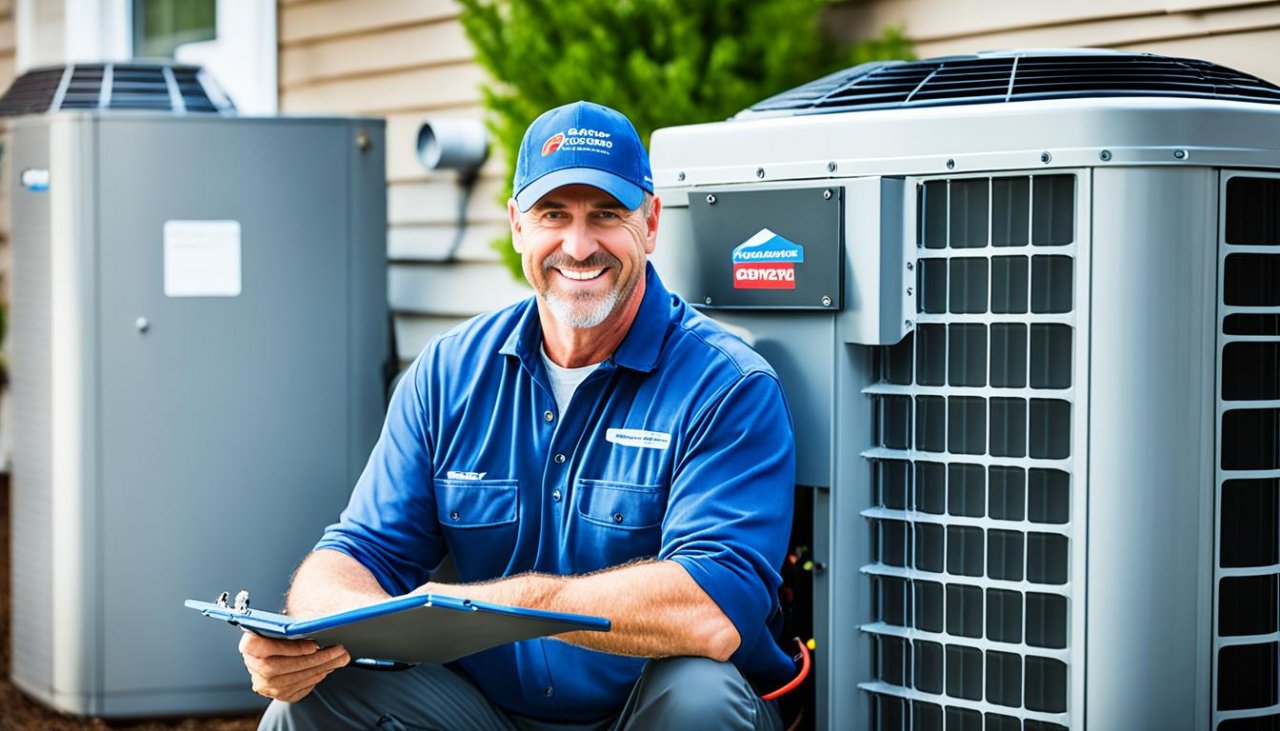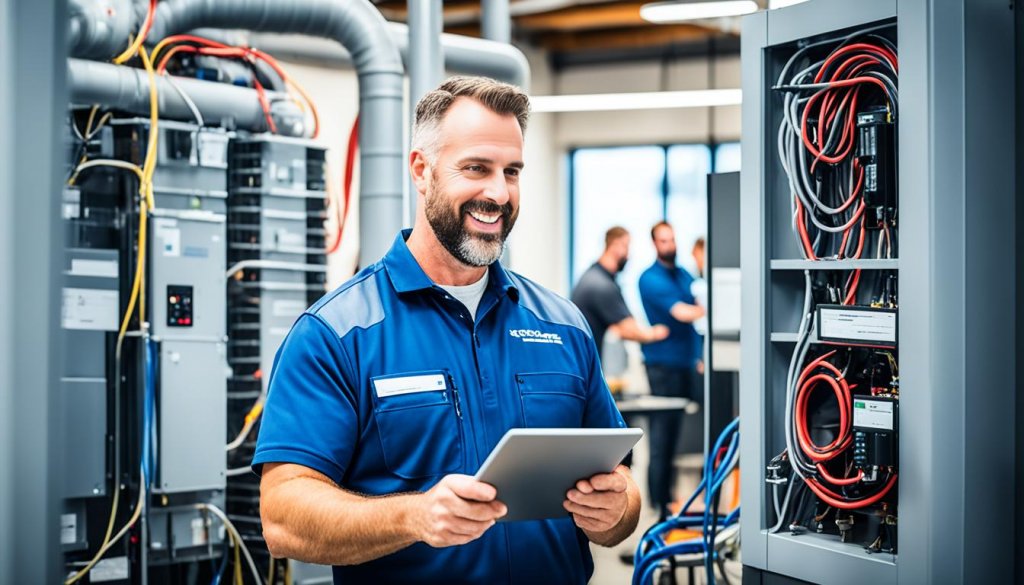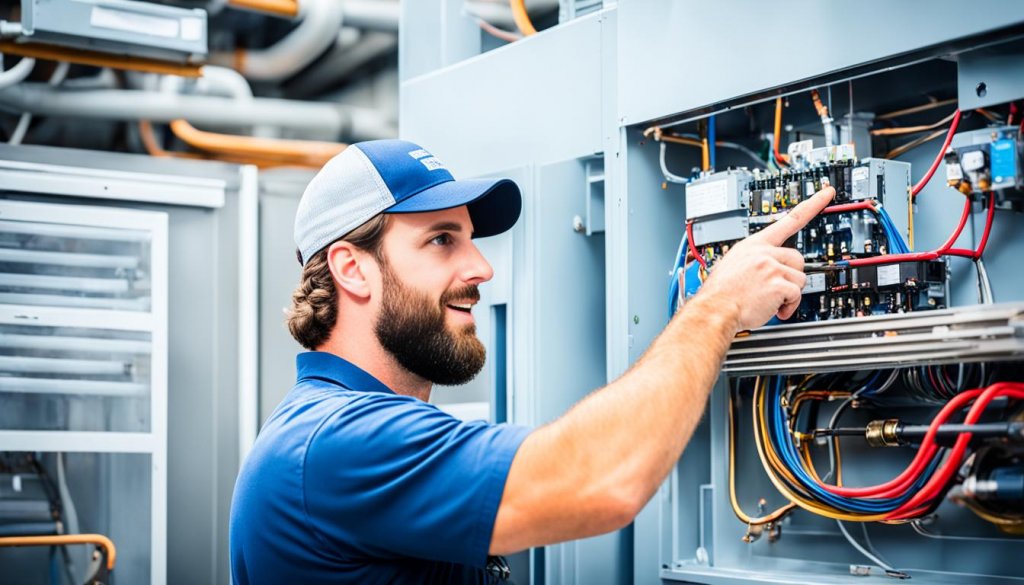Ever thought about what makes customers feel valued in the HVAC world? It’s not just about fixing broken systems. It’s about going above and beyond what people expect. In a crowded market, making customers happy is key to success for HVAC companies. As customers want better service, reliable and efficient HVAC solutions are crucial.
This section looks at what makes customers happy with HVAC services. It shows how great service quality is vital for strong relationships between companies and customers.

Key Takeaways
- HVAC customer satisfaction is critical for attracting and retaining clients.
- Excellent customer service fosters brand loyalty and leads to increased profits.
- Transparent communication and timely service are essential customer expectations.
- Empathy and effective follow-up significantly enhance customer experiences.
- Utilizing technology and CRM systems can improve service delivery and personalization.
The Importance of Customer Experience in HVAC
The customer experience is key in the HVAC industry. It starts when a customer first reaches out to an HVAC service provider. Great HVAC customer experience is essential for growth and loyalty. It helps build strong relationships by making the interaction smooth from start to finish.
Statistics show that 93% of customers come back to a business with great customer service. This shows how important HVAC customer satisfaction is for success. Also, 83% of Americans listen to advice from family and friends, showing the power of a good reputation.
Businesses using the Podium platform can connect with customers faster. Using technology like Field Service Management and CRM software makes things more efficient. These tools help provide reliable and timely service, which customers expect.
Being open and clear in communication builds trust. HVAC companies can improve their customer experience by explaining things clearly and setting expectations. By listening to feedback, they show they care about getting better.
By always finding new ways to improve and keep high standards, HVAC businesses can make their customers happier. Happy customers don’t just come back; they tell others about their good experiences. This helps the business grow and succeed in the HVAC industry.
Understanding Customer Expectations in the HVAC Industry
To truly meet customer expectations in the HVAC industry, I know it’s key to understand what they value most. Gathering feedback through surveys and reviews gives us insights into what customers need and like. This helps us spot issues like unclear communication and surprise costs, letting us improve our services for our clients.
Good communication is key to great service. I aim to build trust and rapport with clients by being clear and understanding. Offering extra help, like energy-saving tips, or following up after service boosts customer loyalty. Being on time is also crucial, as being late can hurt our reputation and scare off future customers.
Consistently delivering top-notch service boosts our reputation and helps grow our business. Knowing that most customers expect quick help for urgent matters guides how we handle customer service. Being clear about prices is vital, as most customers don’t like surprises that could make them doubt us. Quality work and being professional are also top priorities for most customers.
Following up after service shows we care, which 95% of consumers appreciate. Safety, clear communication, and honesty are key values for 73% and 76% of customers. Knowing these expectations helps us offer services that really meet customer needs in the HVAC industry.
Strategies to Enhance HVAC Customer Satisfaction
Improving customer satisfaction in the HVAC industry is key. It’s important to focus on the customer and make them feel heard. By doing this, customers become loyal and share good things about their experience.
Good relationships come from great service. I always give clear estimates and honest updates to gain trust. Using many ways to talk to customers helps me keep in touch and offer personalized service. Training my team in empathy and solving problems makes them better at helping customers.
Offering maintenance services helps us fix problems early, making customers happier. Asking for feedback helps us know what to improve. Rewarding great service shows how much we value our customers. Using smart HVAC tech and good communication helps us meet each customer’s needs, making their experience personal and meaningful.
Leveraging Technology for Better Service Delivery
In the HVAC industry, technology is changing how we offer services. I’ve seen how HVAC service software helps with field service and managing parts inventory. These tools make going from service request to billing smoother, keeping service quality high.
Using CRM and FSM systems together gives a clear view of customer info and operations. This helps us tailor services for each customer. Technology makes scheduling and managing inventory better, helping us avoid stockouts and delays.
HVAC service software offers smart job scheduling and real-time inventory tracking. These features help me run operations smoothly and answer customer questions quickly. IoT and predictive maintenance let our teams handle complex commercial HVAC systems better.
With the right tech, I’ve seen better use of resources and quicker job finishes. Analytics help make better decisions, leading to happier customers and loyalty. This means more repeat business and referrals, helping my HVAC services grow.

How Skilled Technicians Impact HVAC Service Quality
Skilled HVAC technicians are key to a company’s success. Their skills greatly affect the quality of HVAC services. Technicians with NATE (North American Technician Excellence) certification are highly competent. This certification shows they know how to work with different HVAC systems safely and well.
They also keep learning through workshops and courses. This keeps them up-to-date with the latest HVAC technology. Their ongoing training makes them better at their jobs, helping them solve modern problems.
Good communication is important for technicians. When they explain problems and solutions clearly, customers are happier. Happy customers come back, which helps the business grow. Reliable technicians also make customers more satisfied and loyal.
Being on time is crucial for technicians. Sticking to schedules means tasks get done quickly, which pleases customers. It also builds trust in the service. Following safety rules, like using the right equipment and wearing protective gear, keeps everyone safe.
Being physically fit is important for technicians. They often work with heavy gear and in tough conditions. Being fit helps them work better and stay safe. Being able to adapt and learn new things is also key. It helps technicians find new solutions and stay ahead in the HVAC field.
HVAC Customer Satisfaction: Gathering Feedback Effectively
Gathering feedback is key to knowing how happy our customers are. Using an HVAC customer satisfaction survey gives us deep insights into what customers think. It helps us see where we can do better and meet our clients’ needs.
Online HVAC reviews are also crucial for understanding how people see our services. When happy customers share their stories, it boosts our reputation. By responding to these reviews, we show we care about our customers and value their loyalty.
After we finish a job, I like to call our customers to check in. This lets me fix any issues right away. It shows we’re all about giving top-notch service and keeping a strong bond with our customers. Listening to what they say helps us make sure we’re meeting their expectations, which keeps them coming back.
Empowering Staff for Exceptional Customer Service
In the HVAC service world, it’s key to empower staff for top-notch customer service. Training is a big part of this, focusing on skills like talking, solving problems, and understanding others. When employees, especially those who talk to customers, get the right HVAC staff training, they can better meet customer needs.
Building a work culture that values great customer service motivates employees. For example, one company gives a 1% bonus on new jobs after ethics courses. This not only lifts spirits but also makes customers happier.
Checking on HVAC customer service often helps spot what’s going well and what’s not. Watching how fast and professionally staff handle customer calls improves service quality. By giving HVAC workers the power to fix problems fast, 95% of customers stick with the company.
Getting regular feedback from surveys, online reviews, or talking to customers shows what makes them happy. Making changes based on this feedback makes service more personal. The mix of good HVAC staff training and a supportive place leads to great results for both workers and customers.
Building Trust Through Transparency and Communication
Trust is key in the HVAC industry. Being clear and honest about pricing and services is a good start. For example, a mid-sized HVAC company got a 20% increase in repeat business by being open about costs. This honesty improved their reputation and built stronger customer bonds.
Being honest with customers is crucial. Keeping them updated on their service and solving problems quickly makes them feel secure. A company that did this saw a 15% increase in annual revenue thanks to more trust and loyalty from customers. Knowing what you’re paying for makes you trust the service more.
In today’s market, being ethical and eco-friendly matters a lot. People like companies that care about the planet. HVAC companies that act responsibly stand out and gain trust.
Customers now have a big say in what people think of a business online. It’s important to listen to feedback and answer quickly. Only 60% of home service companies do this well. Being open and communicative helps attract new customers.
Getting customers involved in technical talks helps them understand and trust you more. HVAC pros who explain complex ideas simply are 70% more likely to win trust. Checking if customers get the explanations can really boost their engagement.

Setting clear expectations early can cut down on unhappy customers by 80%. Keeping clients updated during a project can increase satisfaction and trust by 90%. If problems come up, quick and professional communication can reduce frustration by 95%. This turns problems into chances to strengthen relationships.
Trust in the HVAC industry relies on being open, ethical, and consistent in communication. Focusing on these areas helps me serve clients better and build strong, lasting relationships for my business.
Implementing Proactive Maintenance Services
Offering proactive HVAC maintenance can make HVAC systems more reliable and avoid costly breakdowns. A 2023 survey by McKinsey found that 99% of organization owners have changed their maintenance plans. This shows how important it is to use preventive steps to boost efficiency and keep customers happy.
Regular checks and quick fixes are key to keeping systems running well. Moving from reactive to proactive maintenance, like Condition-Based Maintenance (CBM), lets me use real-time data to spot problems before they happen. This way, I can reduce downtime and keep things running smoothly.
Using Total Productive Maintenance (TPM) means everyone helps with upkeep. Getting everyone involved in regular maintenance checks makes HVAC systems more reliable and effective. For example, a commercial real estate firm greatly benefited from proactive maintenance, showing how these methods can boost productivity and tenant satisfaction while cutting costs.
The advantages are clear. Proactive maintenance helps catch problems early, saving money and making equipment last longer. Regular safety checks are also crucial. When I suggest maintenance plans to my customers, I build trust and foster long-term relationships. Being consistent in service and clear about costs and timelines helps customers feel secure about their HVAC systems.
Personalization in HVAC Services: Meeting Individual Needs
Personalized HVAC services are key to meeting each customer’s unique needs. By using customer data, I can offer specific advice and solutions that fit their likes, budgets, and property needs. This approach makes the service better and shows I care about meeting customer expectations.
Putting the customer first in HVAC solutions makes people happier and more loyal. For example, if someone needs “furnace repair” or “air conditioning installation,” I can suggest options that fit their situation. These steps help build trust and make my HVAC services a go-to choice.
Listening to what customers say in reviews helps me understand their needs better. This feedback helps me improve my services and make sure I give clients what they want. Personalized services based on real feedback lead to better solutions and help me connect with clients more deeply.
By focusing on personalized HVAC services, I make each customer’s experience better and boost overall satisfaction. These strong connections lead to lasting relationships, which helps my business and meets each client’s unique needs.
Utilizing CRM Systems to Improve Customer Relationships
Using HVAC CRM systems has greatly improved how I manage customer relationships. These systems put all customer info in one spot, like contact details and service history. This makes talking to customers easier and faster.
Automated reminders for appointments help cut down on missed meetings. This makes customers happier and shows I’m reliable. Plus, knowing what parts and equipment I have in stock means I can fix things faster.
Tracking important things like how fast I respond and how happy customers are helps me make better choices. CRM systems have special features for the HVAC industry, like tracking maintenance agreements. This makes my work more efficient, especially when demand goes up.
With more competition, it’s key to stand out. CRM software helps me manage leads better, which means more chances to get new customers. It also helps me schedule things better, cutting down on wasted time and making more work get done.
CRM has made customers 15% happier, and businesses like AC Experts Inc. have seen a 10% increase in sales. Using CRM data can also lead to a 15% jump in sales through better marketing.
I strongly suggest picking a CRM that works well with other systems and gives you real-time data. Technicians can do a better job on-site with the right data and stock info. CRM systems make customers happier and help HVAC businesses do better overall.
Conclusion
In conclusion, making customers happy with HVAC services takes a lot of effort. It’s key to really understand what customers want. By listening to feedback and changing how we work, I make sure my services go beyond what clients expect.
Using new tech, like what Service.Works offers, helps us work better. Being able to answer customer calls any time of the day builds trust. Quick dispatching cuts down on wait times, making our service more reliable and customer-friendly.
At the heart of my HVAC business is clear talking and being open. I make sure to explain things well, offer dependable service, and have clear prices. This way, I can solve customer problems and make them happy. It helps build loyalty, which is good for my business’s growth and success.
See how FieldAx can transform your Field Operations.
Try it today! Book Demo
You are one click away from your customized FieldAx Demo!
FAQ
How can HVAC businesses improve customer satisfaction?
HVAC businesses can boost customer satisfaction by understanding what customers want. They should be clear in their communication and ask for feedback. Offering services that meet each customer’s unique needs is also key.
What role do HVAC technicians play in customer satisfaction?
HVAC technicians are very important. Their skills, professionalism, and how they talk to customers affect the service quality. This leads to happier customers.
Why is feedback important in the HVAC industry?
Feedback is crucial. It helps HVAC companies know what needs to be improved. This way, they can make their services better and keep customers happy.
How can technology enhance HVAC service delivery?
Technology makes things run smoother. It helps with scheduling, customer portals, and apps. This means better service, updates in real time, and happier customers.
What are some effective strategies to foster long-term customer relationships in HVAC?
To keep customers coming back, train your staff well. Be clear about prices and what you’re doing. Offer maintenance services ahead of time. And always ask for feedback to get better.
How important is communication in the HVAC industry?
Good communication is very important. It builds trust and solves problems quickly. It makes customers feel important, which makes them happier with your service.
What benefits do personalized HVAC services offer?
Personalized services mean you’re meeting the customer’s specific needs. This makes customers more satisfied and loyal. They feel you’re really listening to them.
How can CRM systems benefit HVAC companies?
CRM systems keep track of customer info, likes, and feedback. This lets you talk to customers in a way that feels personal. It makes your service better and builds stronger relationships.
What is the significance of proactive HVAC maintenance?
Being proactive means fixing problems before they start. It keeps systems running well and shows you care about your customers. This builds trust and satisfaction over time.
Author Bio
Co-Founder & CMO at Merfantz Technologies Pvt Ltd | Marketing Manager for FieldAx Field Service Software | Salesforce All-Star Ranger and Community Contributor | Salesforce Content Creation for Knowledge Sharing





